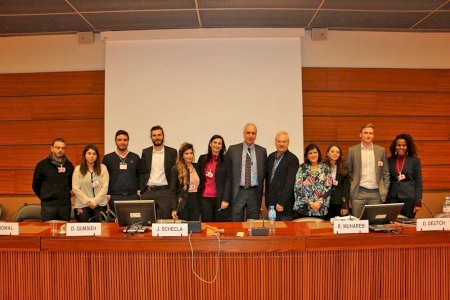Press Releases
(27 March 2018) BADIL’s Engagement with the 37th Session of the UNHRC

PR/EN/270318/07
BADIL’s engagement with the 37th Session of the UNHRC (27 February – 24 March 2018) was extensive and comprised of the following:
- Bilateral meetings between multiple Palestinian NGOs and member state representatives including Algeria, Ireland, Malta, Netherlands, Germany, Croatia and Belgium.
- Bilateral meetings facilitated by BADIL with the Special Rapporteurs of Adequate Housing, Human Rights Defenders and the oPt.
- The submission of one written statement on the Extension of Israeli Sovereignty in oPt Amounts to Annexation and endorsing a joint written statement on Legalising the Illegal: The Status of Jerusalem and Unlawful Forcible Transfer*.
- The submission of 3 oral intervention and endorsing 2 others:
- Under Item 4, concerning arbitrary arrest and administrative detention;
- Under Item 7, Interactive Dialogue with the SR on the oPt, stressing illegal Israeli practices in Jerusalem;
- Under Item 7, on the imposition of Israeli sovereignty to further entrench annexation and colonization.
- The implementation of one joint side event, Ongoing Annexation and Colonization in Jerusalem that included the participation of the SR of the oPt, panelists from the Society of St. Ives, Addameer, Al-Haq and BADIL and moderation by Professor Joseph Schechla.
This particular session’s proceedings were indicative of the gap between what the UNHRC is obligated to do according to the law (instigate practical measures to hold Israel accountable for its human rights violations and crimes) and what it actually does (issuance of additional resolutions).
The SR on the oPt was brazenly maligned by Israeli “watch dog” organizations after the submission of his most recent report on the human rights situation in oPt with regards to the right to health. The Israeli NGOs claimed that SR was unfit for the position and his report was biased and anti-Semitic, comments that eventually solicited a response from the council president and point of order by the State of Palestine representative.
In keeping with tradition, the General Assembly passed 4 resolutions:
- On the Right of the Palestinian People to Self-determination which (in Article 6) called upon “all States to ensure their obligations of non-recognition, non-aid or assistance with regard to the serious breaches of peremptory norms of international law by Israel, in particular of the prohibition of the acquisition of territory by force, in order to ensure the exercise of the right to self-determination, and also calls upon them to cooperate further to bring, through lawful means, an end to these serious breaches and a reversal of Israel’s illegal policies and practices;”
- On the human rights situation in the oPt, including East Jerusalem detailing many policies of forcible transfer including but not limited to the permit regime, denial of residency, discriminatory zoning and planning and land confiscation and denial of use which culminate in “a coercive environment that leads to the forcible transfer of Palestinian civilians in the Occupied Palestinian Territory”;
- On Israeli settlements urging all states and international agencies not to take any actions (including the provision of assistance) that would recognize as legal the illegal situation arising from Israeli colonization of the oPt. Articles 5 and 7 of the resolution highlighted the issue of the creation of the coercive environment through Israeli policies and practices that result in the forcible transfer of the Palestinian population. In addition, the resolution focused on the potential complicity of corporations and called for more stringent application of the Guiding Principles on Business and Human Rights (Article 15).
